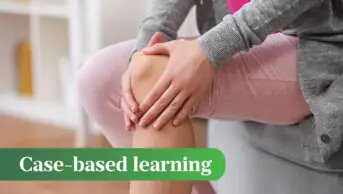
Shutterstock
Experts in pain medicine have said they are “deeply concerned” with the “confusing” terminology used in the National Institute for Health and Care Excellence’s (NICE’s) draft guidance on the assessment and management of chronic pain.
The draft guidance, which was published on 4 August 2020, stated that common pain medicines — such as paracetamol, non-steroidal anti-inflammatory drugs including aspirin and ibuprofen, benzodiazepines, and opioids — should not be offered to patients with chronic primary pain.
Instead, it said that exercise, psychological therapies such as cognitive behavioural therapy, and acupuncture should be offered.
However, in its response to the consultation, which closed on 14 September 2020, the Faculty of Pain Medicine of the Royal College of Anaesthetists said that the draft guidance failed to “succinctly distinguish” between chronic pain and chronic primary pain.
NICE defines chronic primary pain as chronic pain which is a condition in itself and which cannot be accounted for by another diagnosis, or where it is not the symptom of an underlying condition; it is characterised by significant emotional distress and functional disability; and examples include chronic widespread pain and chronic musculoskeletal pain, as well as conditions such as chronic pelvic pain.
But the faculty said that the terminology was “highly confusing and damaging” and that there was a “serious risk” that the recommendations would be taken to apply to all chronic pain. It said that this “essentially” resulted in the guidance “not being fit for purpose”.
These concerns were echoed in the Royal Pharmaceutical Society’s (RPS’s) response to the consultation. It said that there had been “some concern” among its member about the use of the term chronic primary pain.
“It is not yet widely recognised or used in pain circles, let alone generalist services,” the RPS said.
“We suggest improved clarity and information about the diagnostic terminology and the need to clearly differentiate between chronic primary pain and other pain conditions.”
The RPS went on to say that the “lack of clarity” would result in a “large proportion of the population” who have chronic pain from a specific cause being denied the appropriate analgesics.
Instead, it said that each case needed to be assessed individually, including considering the potential withdrawal of medications, and that that needed to be made clearer in the NICE guidance.
The RPS did welcome the use of counselling, acupuncture and exercise as part of the management of chronic pain, and said that all of them had the potential to be a “valuable” part of an individual’s treatment.
You may also be interested in

Research proves that antibiotics are ineffective in chronic lower back pain with Modic change

Antidepressants mostly ineffective at reducing pain, finds meta-analysis
